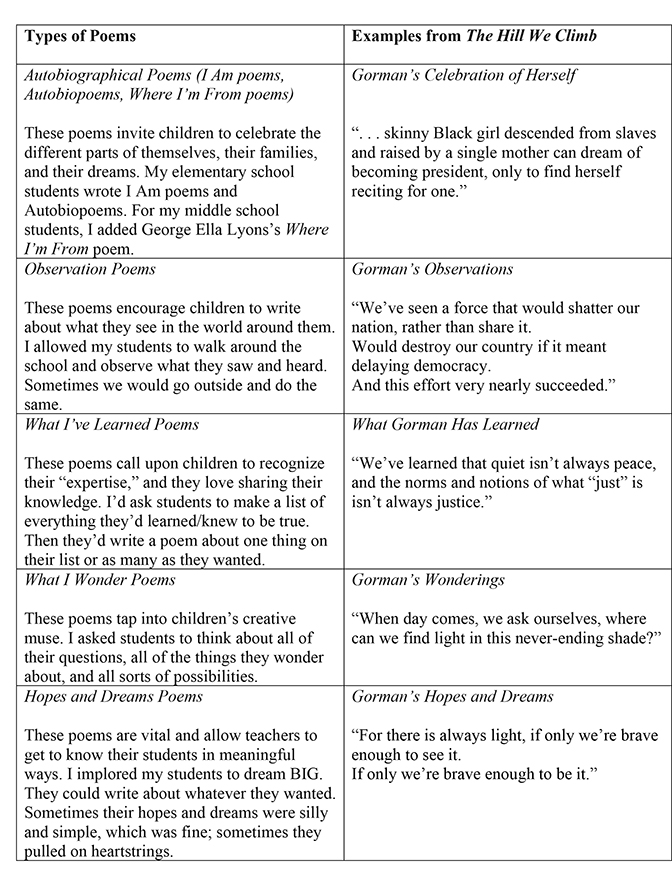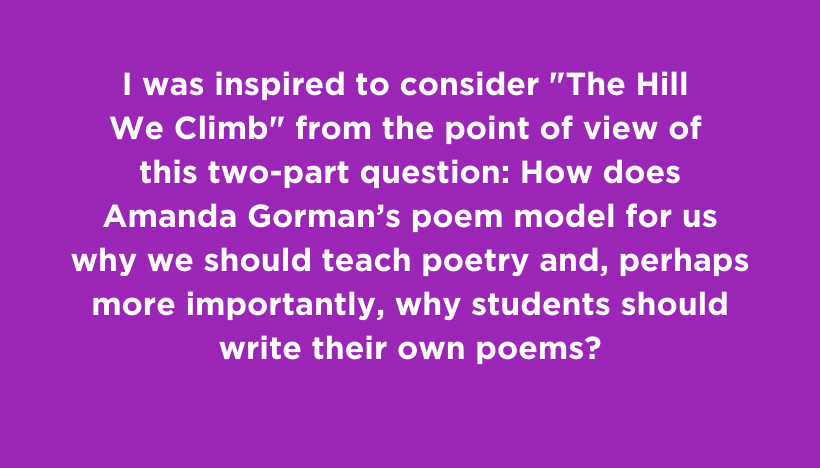This post was written by NCTE member Valerie Bolling.
Amanda Gorman. In the short time since most of us heard her poem, her name has been emerging continuously from mouths across the globe. When the topic of the Biden/Harris inauguration enters a conversation, Gorman’s name, like the light she refers to in The Hill We Climb, immediately illuminates the space. Gorman delivered an inaugural poem that will be quoted and revered for years to come.
I was as impressed as everyone else by the brilliance and eloquence we all witnessed, and, as an educator, I viewed this experience through another lens as well. I saw the possibilities for lessons. Yes, there are lessons that we can learn by examining the lines of the poem and applying them to ourselves and to the occurrences in our world. Lessons about how to maintain resilience and hope. Lessons about connection and community. Lessons about language and word play.
I was inspired to consider The Hill We Climb from the point of view of this two-part question: How does Amanda Gorman’s poem model for us why we should teach poetry and, perhaps more importantly, why students should write their own poems?
Poetry is the surest way to allow students to celebrate themselves—who they are, what they enjoy, what they care about, what they wonder about, what gives them hope. Therefore, we must provide a classroom experience immersed in poetry.
The left column in the chart below describes different types of poems that my elementary and middle school students have written. The right column shows examples of how The Hill We Climb reflects a conglomeration of elements in these poems.

Not only can The Hill We Climb serve as a mentor text for young poets, but Gorman used mentor texts of her own. She shared that she was inspired by tweets she read in reaction to the Capitol insurrection, used references from Hamilton, and read speeches by famous orators, such as Martin Luther King Jr. and Abraham Lincoln.
Can you recognize the evidence of mentor texts in these lines from The Hill We Climb?
We will rise from the golden hills of the West.
We will rise from the windswept Northeast where our forefathers first realized revolution.
We will rise from the lake-rimmed cities of the Midwestern states.
We will rise from the sun-baked South.
This is certainly reminiscent of King’s I Have a Dream speech and Angelou’s poem Still I Rise.
What a wonderful example for students to see that even the greatest poets use mentor texts. And, yes, Amanda Gorman is inarguably one of the greatest.
The ultimate truth: The real reason students should write poetry is for sheer enjoyment! I’ve never had a student who wasn’t excited about writing poetry. Sure, a few may be reluctant at first, but once they realize they can write about whatever they want in whatever way they want, they become poets.
Poetry is the truest form of equity. Students who struggle with more traditional writing assignments experience success writing poems. They build their confidence writing poetry and can then transfer those skills to other forms of writing. Even in an essay, they can infuse poetic language.
I still remember the first poem one of my ESL students wrote. She had recently arrived from Austria and didn’t know English. Her first poem was “Ha Ha Ha!” She used simple language and the repetition of “ha ha ha.” When she read it aloud, the class laughed along with her. It was an instant hit!
I’ve seen poetry heal, too. Students have written about a cat who died, a grandmother with Alzheimer’s, a friend moving away. When sharing their poems, they connect with their classmates over shared experiences, and I’ve been able to connect with them in a new way, too.
Finally, children should write poems because poetry is about more than the words on the page. It’s about the sound and delivery of the words. Will you turn your words into a song? Will you rap? Will you recite spoken-word style?
We want a poem’s words to flow forth and shower us with wisdom and awe. We want to hear them. And, in the case of Youth Poet Laureate Amanda Gorman, we want to hear them again and again.
I want to hear the words of all of our children. I want them to feel seen and heard, valued and validated. As an author, I want them to see themselves in the pages of books. Even more, I want them to write their own stories, and their own poems. When we listen to children read their poems, we learn things that we might not have otherwise discovered about them. To paraphrase Gorman’s words, poetry enables children to see the light and to be the light.
Additional resource: Here’s a lesson created by Greenwich High School teacher Rebecca Wilson: Inauguration Poem Analysis. It was inspired by and uses questions and resources from this PBS lesson.
 Valerie Bolling has been an educator for 28 years and is currently an instructional coach for Greenwich Public Schools in Greenwich, Connecticut. When she’s not collaborating with teachers or leading the middle school humanities curriculum team, she writes picture books. Her debut picture book Let’s Dance! was published in March 2020. She has two books scheduled for release in 2022 and two more slated for 2023. Visit Valerie Bolling’s author website.
Valerie Bolling has been an educator for 28 years and is currently an instructional coach for Greenwich Public Schools in Greenwich, Connecticut. When she’s not collaborating with teachers or leading the middle school humanities curriculum team, she writes picture books. Her debut picture book Let’s Dance! was published in March 2020. She has two books scheduled for release in 2022 and two more slated for 2023. Visit Valerie Bolling’s author website.
It is the policy of NCTE in all publications, including the Literacy & NCTE blog, to provide a forum for the open discussion of ideas concerning the content and the teaching of English and the language arts. Publicity accorded to any particular point of view does not imply endorsement by the Executive Committee, the Board of Directors, the staff, or the membership at large, except in announcements of policy, where such endorsement is clearly specified.

